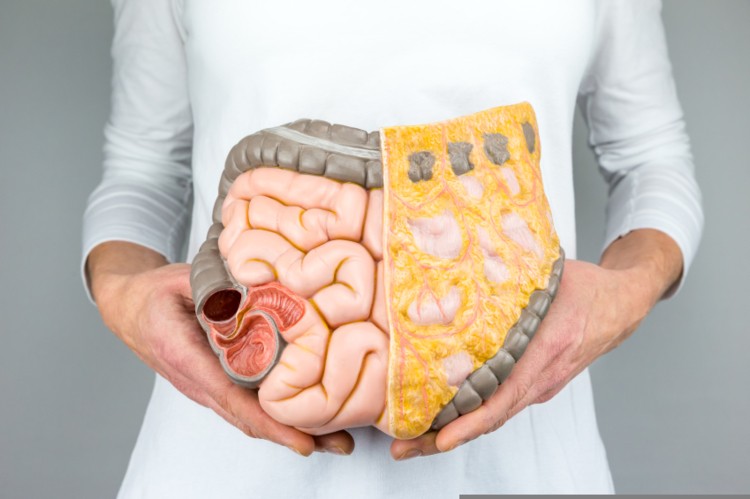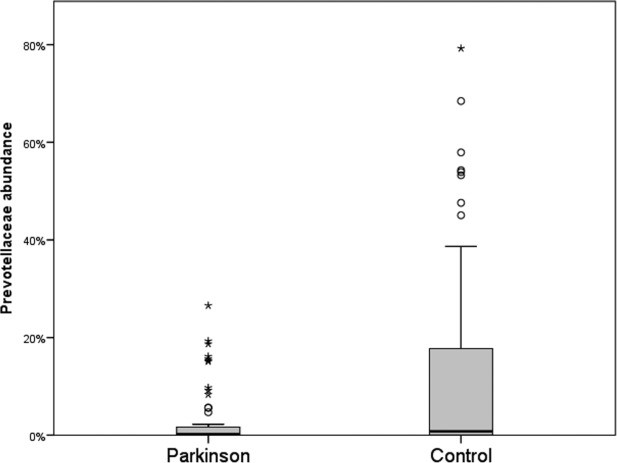Parkinson's disease and the microbiome
Parkinson's disease and the microbiome

Changes in the microbiota of the gut may cause problems that not only lead to alterations in the gastrointestinal tract and immune system, but also influences the enteric nervous system (ENS) as well as neurons and glial cells. Studies done by Keshavarzian et al. showed that patients with Parkinson's Disease (PD) have alpha-synuclein accumulation in the nerves of their proven inflamed colon. Moreover, in patients with PD the microbiota in the colon is disturbed which could lead to dysbiosis. This might be the mechanism causing misfolding in alpha-syn, which is an important protein in the pathogenesis of PD, and therefore PD pathology [1] (see this article for additional information). More and more studies show stronger proof that microbiota in the gut interacts with the autonomic and central nervous system via many pathways including the enteric nervous system and vagal nerve [2].
The microbiota and microbiome of patients with
Parkinson's Disease
So the
microbiota of Parkinson's disease can play a role in the pathology of the
disease, but what does the microbiota of a PD patient then look like? This was
i.e. investigated in the study done by Scheperjans et al. in 2015. They found
out that the abundance of family Prevotellaceae in the PD patients feces was
reduced by more than 75% as compared with controls [2]. Prevotellaceae
is a bacterial family which is present in the human host, where they can be
opportunistic pathogens [3]. It seems that the prevalence of the order
Enterobacteriaceae was associated with the severity of PD. Furthermore, a
logistic regression could classify PD patients based on the four bacterial
families and the severity of constipation with sensitivity of 66,7 and
specificity of 90,3%. The data in this study suggest that the microbiome in PD
patients is indeed different and is related or maybe a predictor for the motor
phenotype in this disease [2].

Box plots showing the spreading of Prevotellaceae abundance in both study groups. High levels of Prevotellaceae were sporadic in the PD group. Low levels were present in both groups. Median: Parkinson 0.16%, Control: 0.77% [2].
Unger et al. hypothesised that these changes may be due to an alteration in concentration of short chain fatty acids, SCFA for short, which is one of the major metabolic products of the gut microbiota [4]. Their study shows that there is indeed a change in SCFA. In PD patients the concentration of this metabolic product has been reduced in the feces. Unger et al. suggest that these changes in concentration can initiate alterations in the enteric nervous system and therefore contribute to the GI dysfunction.
A very recent study was done by Qian et al in 2018 with PD patients in China. This case control study was performed with Chinese PD patients. They analysed the relationship between fecal microbiota and clinical symptoms occurring in PD. In this study the difference between the richness and structure of the fecal microbiota between healthy individuals and PD patients was also seen. In general the Genera Clostridium IV, Aquabacterium, Holdemania, Sphingomonas, Clostridium XVIII, Butyricicoccus and Anaerotruncus were more abundant in the feces of PD patients. Escherichia and Shigella were negatively associated with duration of the disease. Generally, the gut microbiota dysbiosis does indeed also occur in Chinese PD patients [5].
These differences found in the fecal microbiome between healthy individuals and patients with Parkinson's disease provides new information and understanding in the pathogenesis of Parkinson's Disease. Even though no trails are running on manipulating the microbiome via for example Fecal microbial transplantations, studies like these will offer us more insights for possible therapeutic options, like adapting the guts microbiota.
Want to know more about our microbiome? Read
the introduction on this page.
Written by Jodie Dekker
Posted on 13 oct 2018
[1] Keshavarzian A et al. Colonic bacterial composition in Parkinson's disease. Mov Disord. 2015 Sep; 30(10). p.1351-1360.
[2] Scheperjans F et al. Gut microbiota are related to Parkinson's disease and clinical phenotype. Mov Disord. 2015 March; 30(3). p.350-358.
[3] https://en.wikipedia.org/wiki/Prevotellaceae
[4] Unger MM et al. Short chain fatty acids and gut microbiota differ between patients with Parkinson's disease and age-matched controls. Parkinsonism Relat Disord. 2016 Nov; 32. P. 66-72.
[5] Qian Y et al. Alterations of the fecal microbiota in Chinese patients with Parkinson's disease. Brain Behavior Immunity. 2018; 70 p. 194-202.

